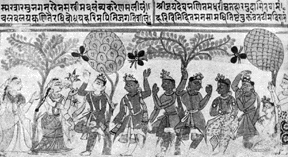
During my last visit to Sridhama Mayapura I had the great fortune of getting the darsana of Srila Bhaktipramode Puri Maharaja. Now ninety-seven years old, he was an affectionate friend and godbrother of both Srila Sridhara Maharaja and Srila Prabhupada. Srila Puri Maharaja joined the mission of Srila Bhaktisiddhanta Saraswati Thakura in 1922 and has been an active preacher in Lord Chaitanya's sankirtana movement ever since. We discussed many transcendental topics with Srila Puri Maharaja and were very happy to see his mood of extreme reverence for Srila Sridhara Maharaja, Srila Prabhupada, the holy name, the Vaisnavas, and the teachings of Mahaprabhu. Most of all we were very touched at heart by his deep humility and gentle dealings.
One evening as we sat at Srila Puri Maharaja's lotus feet hearing about what it means to be a genuine Vaisnava, we were astounded when suddenly Srila Puri Maharaja said, "There is a wave of sahajiyaism coming to the Western world and you must preach against this misconception." What did he mean, "a wave of sahajiyaism is coming to the Western world?" Sahajiyaism we know means to imitate. Imitate ecstasy, imitate the behavior of exalted Vaisnavas, to take things cheaply by not following the four regulative principles and the recommended process of devotional service -- these practices are sahajiya. We have read about these things in Srila Prabhupada's books and we are no doubt aware of the shortcomings of sahajiya tendencies-or are we?
"There is a wave of sahajiyaism coming to the Western world and you must preach against this misconception."
If a man comes to your temple or your house dressed in a sari, wearing a nose-ring, chanting Hare Krsna and rolling on the ground with tears of ecstasy in his eyes -- well -- you probably will recognize his sahajiya tendencies and reject his association. But beyond these gross manifestations of sahajiyaism do we actually understand what a sahajiya is and how to avoid sahajiya tendencies? Apparently not, or Srila Puri Maharaja would not have mentioned it so strongly.
Further discussions with Srila Puri Maharaja revealed what he meant. Not only will the Caste Goswamis, Gauranagaris, Aula, Baula, Sakhi-bhekis, Daravesa, Sani, Smartas, Ativadi, Cudadhari, Prakrta Sahajiya, and many other worthless schools of imitation come to spread their nonsense in the West, but members of our own sampradaya are already introducing sahajiyaism. They are doing this in the name of raganuga-bhakti.
Raganuga-bhakti, the topic for the 90s -- what is it, and how do you do it? Srila Puri Maharaja stressed that if a sannyasi or a brahmacari thinks that he has become a raganuga bhakta or a rasika and wants to hear about the confidential lila of Krsna and the gopis without first having the proper qualifications, he runs the risk of becoming a woman with a mundane body in his next life!
But shouldn't we aspire for the highest truth, rasamanandam ? It is a tricky question. We must move in the direction of truth, and we must have proper knowledge -- yet at the same time we must exercise great caution. To want to know everything about Krsna-lila is a defect and it will cause us to fall down. It is to our advantage to always seek a lower position as a servant. This is the spirit we find in Ragunatha dasa Goswami's Vilap-kusamanjali. In this book our prayojana-tattva-acarya is praying for service, not entertainment.
Srila Prabhupada did not often discuss higher topics with his disciples, and certainly never with the general public. Yet he no doubt wanted his disciples to experience the highest esoteric reality of Gaudiya Vaisnavism. From the very beginning of his preaching campaign, he informed his disciples of the sadhya, the goal of our perfection. Later, however, he held back from discussing higher topics having understood our lack of qualification.
As early as 1967 Srila Prabhupada told one of his disciples the story of Jayadeva Goswami's writing the Gita-Govinda. Dehi pada pallavam udaram. This verse was spoken by Lord Krsna to Srimati Radharani during their intimate conversations. Here with great urgency and necessity Krsna begs for the pardon of Srimati Radharani, "Please forgive me and place your lotus feet on my head." This is a most high and esoteric concept -- that Krsna himself is declaring the exalted position of Srimati Radharani as the supermost worshippable object. This kind of thinking is not possible for beginners -- the neophytes cannot conceive of such an exalted position. How is it possible? The whole world is searching for Krsna: all the yogis, munis, and sages. Even Brahma, Siva, and Visnu desire the darsana of Krsna, but Krsna is begging for the mercy of Srimati Radharani. Just see how great she is!
When Srila Prabhupada uttered this verse, he began to feel great ecstatic emotions within but he checked himself for the benefit of his disciple. While describing the love affairs between Radha and Krsna, Jayadeva thought of these words, dehi pada pallavam udaram. When this happened Jayadeva was astonished, "What is this! How has such a thought entered my mind? I cannot write such a thing. How is it possible?"
Jayadeva could not conceive of such a thing. How could Krsna, the Supreme Lord, ask for the feet of Srimati Radharani to be placed on his head? Jayadeva had great devotion and love for Krsna as the topmost supreme entity therefore it was not appropriate for Krsna to utter such words. Jayadeva could not bring himself to write such a verse. He began to tremble and the pen fell from his hand.
Feeling somewhat disturbed, Jayadeva decided to go to the Ganges for bath. Jayadeva informed his wife. "O good wife, I shall go to the Ganges for bath. Please prepare my meal and have it ready when I return." Jayadeva then left the house and started for the Ganges. A short time later Jayadeva returned to the house and requested his wife to immediately serve prasadam, as he was very hungry. Jayadeva's wife then served her husband after which Jayadeva returned to his study and began writing.
As is the custom in India, Jayadeva's wife then sat down after her husband had eaten and began to take her prasadam. Suddenly Jayadeva appeared at the doorway of his house and began to call for his wife requesting her to serve prasadam as he was very hungry. Astonished to hear such a thing, Jayadeva's wife informed her husband, "My most respected husband, upon returning from the Ganges you have already taken your meal and in turn I have already taken my prasadam. After that you went to your study and continued your writing. Why do you now say that you are very hungry and that you want to take prasadam?"
Hearing this Jayadeva was bewildered and unable to understand the strange behavior of his wife. Upon entering his study, Jayadeva became even more astonished when he saw that the verse that he had hesitated to write was now written on the manuscript in his own handwriting. Krsna himself had come to complete the verse. Krsna had wanted Jayadeva to disclose this most inconceivable truth but he hesitated, so Krsna did it himself. "O Sri Radha, your holy lotus feet are very kind and generous. The burning poison of Kamadeva, which is always pressing me, will be finished if you place your lotus feet on my head. Only you can save me."
Although Srila Prabhupada described this pastime and its significance as early in his mission as 1967, he never again uttered this verse during the remaining ten years of his preaching mission until 1977. At that time, he spoke the same verse while chastising a film producer who came to get his blessing for producing a film on "Krsna-lila. " Srila Prabhupada was outspoken and firm -- he had no intention of ever blessing such a project. And his reasons were obvious --"who will understand your film production?"
It is now 1995. How and when will we ever realize the significance of Jayadeva's realization? Shall we just chant and be happy, waiting for everything to descend? Yet "chant and be happy" is both the most basic and the highest instruction at the same time, for as Srila Puri Maharaja explained, "There is no possibility of ever experiencing Krsna-prema without chanting purely." Through harinama all good fortune will come to us in due course. What about reading about rasa-tattva ? Srila Puri Maharaja instructed us thus: "Such books must be read with the spirit of crushing lust and greed." Without this, such reading will be counterproductive. It will serve only as the uddipana of the sthayi-bhava of our material life. "These books," he said, "are not to be read for entertainment."
To guide us in our approach to the upper world, Srila Bhaktisiddhanta Saraswati Thakura has composed a nice verse that recommends that the highest aspirations in our bhajana life be kept overhead:
pujala ragapata gaurava bangemattala sadhu jana visaya range
The path of divine love is worshippable to us and should be held overhead as our highest aspiration.
To exemplify this idea of keeping the highest ideals above our heads, Srila Sridhara Maharaja often spoke of how Srila Saraswati Thakura wanted to reside at Govardhana rather than at Radha-kunda. "I am not fit to live in Radha-kunda. So I shall live in a lower position, but my gurus -- Gaurakisora dasa Babaji, Bhaktivinoda Thakura, and others -- are fit to serve there. So I shall go and serve them there in Radha-kunda, and then return to a little lower position, in Govardhana. There I shall stay."
First deserve, then desire. To discuss confidential topics about Krsna-nama and Krsna's rasa-lila in the presence of persons who do not have the required adhikari, or qualification, constitutes an aparadha, an offense: asraddadhane vimukhe 'py asrnvati. Offenses of this kind must be avoided by one who wants to progress in Krsna consciousness. But the higher subject matters must be discussed -- they are not forbidden. For this discussion to be proper there must be a qualified speaker and a qualified listener.
Srila Prabhupada's example is pertinent. Although Srila Prabhupada was internally relishing the confidential truths regarding Gaudiya Vaisnavism, he was very discrete about openly discussing such truths even among his most qualified disciples. Although outwardly not discussing the esoteric pastimes of Krsna, internally Srila Prabhupada was fully conscious of the sublime mellows of love of God. Like his spiritual master, Srila Bhaktisiddhanta Saraswati Thakura, outwardly Srila Prabhupada worshipped the way of divine love with grandeur, awe, and reverence, but his object was that of the simple and beautiful divine love of Vrndavana.
A devotee who internally relishes the transcendental pastimes of Radha and Krsna is called a rasika-bhakta. One must approach such higher devotees sooner or later to realize the inner truth of Krsna consciousness, ghuyam akhyati prcchati. Yet even if we are qualified to do so, we are still posed with a further problem. How do we tell the difference between a rasika acarya and a sahajiya?
I think it is safe to say without objection from our readers that Srila Prabhupada was a rasika-acarya. As such we can get a glimpse into the symptoms of rasika-bhaktas from his example and learn further about the proper approach to the higher subject matter by observing the mood of his presentation.
There is no possibility of ever experiencing Krsna-prema without chanting purely.
Although keeping everything within-not allowing his ecstasy to manifest on the external plane -- the depth to which Srila Prabhupada relished Krsna consciousness would sometimes become revealed in something he did or said. For the most part, however, his internal mood was couched within his dress as a world acarya, as jagat-guru, as a humble servant of his spiritual master and a preacher of Bhagavad-gita As It Is. In this way Srila Prabhupada was constantly engaged in kirtana and preaching for the benefit of the fallen conditioned souls. Keeping Srila Prabhupada's example in mind, we must simultaneously remember that Srila Prabhupada is not the only rasika bhakta, and they do not all act entirely the same way.
A very different example of a rasika bhakta is that of Pundarika Vidyanidhi. Whenever Pundarika Vidyanidhi happened to hear the topics of Krsna-lila, he would become overwhelmed with ecstasy and exhibit sattvika-bhavas, such as trembling, faltering of the voice, shedding tears, fainting, rolling on the ground, and speaking like a madman. Seeing these extraordinary bodily manifestations of love of God, one who knows the science of love of God can understand something about the exalted position of Pundarika Vidyanidhi. Outwardly he appeared very ordinary, if not materialistic, but inwardly he was a devotee of the highest caliber. Of the highest caliber to say the least-he was the incarnation of King Vrsabhanu, the father of Srimati Radharani.
Thus to understand the internal workings of a rasika devotee is not an easy matter -- vaisnavera kriya-mudra vijne na bujhaya. But we must try if we are to make progress. What shall be our guiding light? Ultimately, we must move according to our faith. Yet enlightened faith is required, not blind faith. Scripture is there to guide us, sastra caksus. A discriminating devotee, madhyama adhikari, must make such determinations. Such determinations, however, must be based on a thorough understanding of the revealed scripture, lest one prematurely condemn the rasika bhakta or prematurely praise the sahajiya.
As for the examples of rasika bhaktas mentioned, we should concern ourselves more with the example of Srila Prabhupada than that of Pundarika Vidyanidhi. Why? Because cheaters often imitate the behavior of devotees like Pundarika Vidyanidhi but they almost never imitate the preachers like Srila Prabhupada. Yet at the same time Pundarika's example is also pertinent if we study it closely. Pundarika Vidyanidhi never claimed to have love of God. When his advanced symptoms overcame him, after coming to external consciousness he would attribute them to epilepsy, thus attempting to conceal his prema. In this, Srila Prabhupada and Pundarika Vidyanidhi are one, although different in outer appearance.
Prema is not something to brandish about and show off as the sahajiyas pretend to do. Its very nature is that it is confidential. Thus the sruti tells us, "One who says he knows Brahman does not know Brahman." More explicitly, Srimati Radharani through the pen of Srila Visvanatha Cakravarti Thakura has told the world this secret of prema: "Thus o friend, as long as the light of prema does not shine on one's face, it will shine in the lovers' hearts. But if it is brought outside, it will vanish or be dimmed. O auspicious girl, remove the darkness of your doubts by opening the box of my heart and looking at the secret jewels of love therein. Hold them in your heart and never show them to anyone!" (Prema Samputa 68 & 111)
Although the rasika bhaktas try to hide their prema, we should recognize them by such and ardently try to take shelter of their lotus feet. We should make the goal of our life the pleasure of Krsna's dearest servants. That will automatically qualify us for the higher plane. If we become intruders of Krsna-lila, if we try to jump ahead without proper qualification, then we will certainly be cast down.
It is the duty of all the disciples, and especially the sannyasis, of Srila Prabhupada and Srila Sridhara Maharaja to preach against the advances of sahajiyaism in the Vaisnava community here in the Western world. It is also the sannyasis duty in particular to cultivate raganuga bhakti. Srila Puri Maharaja remarked that to be a real sannyasi one must not only preach, but also tread the raga marg. This is so because the sannyasa mantra is a raga marg mantra. Thus sannyasis in our line should be acquainted with the meaning of the sannyasa mantra and aspire for the day when genuine eagerness for raga bhakti awakens within. If the sannyasi's do so while simultaneously preaching, it will be a great service to Chaitanya Mahaprabhu's movement. The standards for preaching and bhajana have already been established for this movement by Srila Bhaktisiddhanta Saraswati Thakura, and as Srila Puri Maharaja has recently requested, we should take inspiration from Saraswati Thakura and do the needful.




